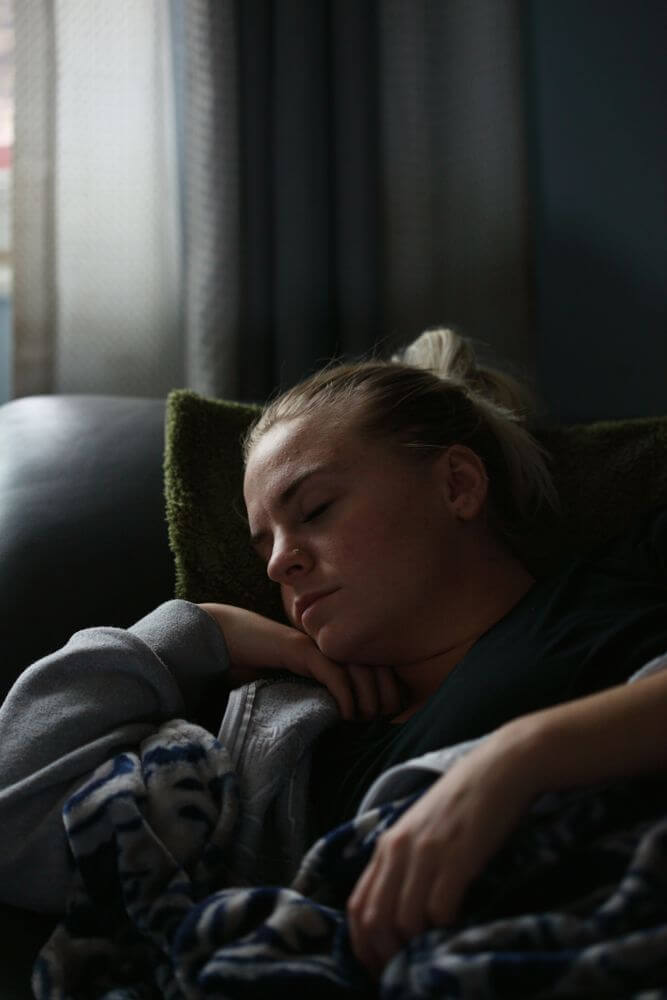Menopause Fatigue: Everything You Should Know
Learn about the causes of menopause fatigue and effective ways to manage and improve your energy levels. Click and learn more in our blog post!

Does Menopause Make You Tired?
Menopause is a natural transition women experience in their 40s and 50s, signalling the end of their reproductive years. This phase is triggered by the body's declining production of oestrogen, a crucial sex hormone. As a result, women may face a range of challenging symptoms that impact their daily lives. Among these, menopause fatigue stands out as one of the most common complaints. Together, we’ll delve deeper into menopause fatigue and explore its implications.
What is Menopause Fatigue?
There are moments when individuals experience feeling overwhelmed and tired due to multiple factors, such as work demands and family responsibilities. These instances of fatigue are typically transient and can be addressed through proper mindfulness techniques and adequate rest. Recognising these feelings and responding with appropriate self-care strategies can help alleviate temporary exhaustion.
On the other hand, menopause fatigue is a more severe and persistent form of exhaustion that cannot be resolved through rest alone. This type of fatigue is specifically experienced by women going through perimenopause and menopause:
Common symptoms of menopause fatigue include:
1. An overwhelming tiredness and exhaustion that persists despite adequate sleep.
2. A feeling of being "completely and constantly wiped out".
3. Impact on both physical and emotional well-being
Unlike regular tiredness, menopause fatigue is a constant sense of exhaustion that doesn't improve with rest. If this fatigue is left unresolved for too long, it can significantly affect daily life, work performance, and relationships.
Causes of Menopause Fatigue
Menopause fatigue is primarily driven by hormonal fluctuations, which trigger a cascade of consequential symptoms that can further exacerbate the overall feeling of exhaustion. Below are the three causes of menopause fatigue.
Cause 1 - Hormonal Fluctuations
The symptoms of perimenopause and menopause can be traced back to the hormonal shifts occurring as women enter this phase of life. The significant decline in oestrogen and progesterone levels not only leads to physiological changes in the menstrual cycle and ovarian function, but also triggers a range of symptoms - particularly in cases of premature menopause (occurring before age 40) where this hormonal depletion can be more abrupt. Among these, severe exhaustion or fatigue stands out as a particularly challenging issue. These hormonal fluctuations affect various bodily systems, including metabolism, and mood regulation, contributing to the persistent menopause fatigue many women experience.
Cause 2 - Sleep Disturbances
Hormonal fluctuations during menopause can trigger a cascade of symptoms, including hot flashes, night sweats, and increased anxiety. These symptoms often disrupt sleep patterns, causing frequent nighttime awakenings and resulting in poor-quality rest. Unfortunately, hot flashes and night sweats are incredibly common symptoms experienced by up to 80% of women going through menopause. Additionally, symptoms of anxiety, particularly somatic anxiety, have been strongly associated with an increased risk of hot flashes, further intensifying sleep issues. This sleep disturbance creates a compounding effect and can worsen daytime fatigue.

Cause 3 - Stress
Menopausal symptoms often coincide with other midlife stressors. For instance, women may find themselves juggling increased work pressures, caring for both children and ageing parents, while also dealing with sleep deprivation. This chronic stress can exacerbate menopausal symptoms, leading to more frequent hot flashes and heightened mood swings.
The relationship between stress and menopausal symptoms is bidirectional. Stress can intensify symptoms, while the symptoms themselves can increase stress levels. This creates a feedback loop that can significantly impact sleep quality and overall well-being. Poor sleep, in turn, feeds into the cycle of fatigue, making it more severe and persistent.
Symptoms of Menopause Fatigue
Menopausal fatigue can manifest in various ways, with women experiencing different combinations of symptoms. Here are some of the most common symptoms of menopausal fatigue.
Symptom 1 - Overbearing tiredness
The most noticeable sign of menopause and post menopause fatigue is an overwhelming tiredness that feels never-ending. Unlike normal exhaustion, this fatigue doesn't improve after a good night's sleep. Women often find that daily activities become much harder because they feel so drained, which leads to reduced productivity. This persistent tiredness can make even simple tasks feel like significant challenges, impacting work, home life, and overall well-being.
Symptom 2 - Difficulty Concentrating
Women going through menopause often experience "brain fog" - a frustrating state where thinking feels cloudy and unclear. This can mean:
- Struggling to concentrate
- Forgetting things more easily
- Finding it harder to think quickly
- Feeling mentally slower than usual
Poor sleep during menopause makes these mental challenges worse. As tiredness builds up, staying focused becomes increasingly difficult. Many women find this particularly challenging when trying to work or manage daily responsibilities, as their usual mental sharpness feels temporarily lost.
Symptom 3 - Emotional Dysregulation
The emotional dysregulation experienced during menopause can catch many women off guard. During this time, women might notice:
- Feeling more sensitive than usual
- Reacting more strongly to situations
- Struggling to cope with stress they previously handled easily
- Experiencing sudden and unpredictable mood swings
- Feeling more irritable or easily frustrated
The ongoing tiredness can make these emotional experiences feel even more intense, creating a cycle where exhaustion affects mood, and mood changes add to feeling worn out.
3 Effective Ways to Manage Menopause Fatigue
Menopause fatigue isn't something you have to simply endure. There are practical ways to manage these symptoms and help you feel more like yourself again. With the right approach, you can reduce the impact of fatigue and regain a sense of normal.
Tip 1 - Address the hormonal fluctuations with HRT
Hormone Replacement Therapy (HRT) is a widely used treatment for perimenopause and menopause symptoms. It works by replenishing the declining levels of key sex hormones, primarily oestrogen and sometimes progesterone.
By addressing the root cause of menopause, HRT can help:
- Reduce menopause fatigue
- Alleviate night sweats and hot flashes
- Improve sleep quality
Additionally, HRT may counteract the effects of hormone deprivation, which is linked to accelerated ageing processes such as muscle loss, reduced bone density, and other age-related health declines.

Beyond symptom relief, HRT offers long-term benefits like reducing the risk of cardiovascular disease and osteoporosis, thanks to oestrogen's protective effects.
HRT comes in various forms, including patches, gels, pills and creams, allowing women to choose the most suitable option.
Tip 2 Optimise Diet and Supplement Intake
For women entering menopause, optimising lifestyle choices can effectively combat fatigue and enhance long-term health, especially given the increased risk of cardiovascular disease (CVD) menopausal women face as a consequence of oestrogen decline.
Start by identifying and minimising harmful habits. Reducing caffeine and alcohol intake, particularly in the evening, can significantly improve your well-being. These changes may decrease hot flashes and night sweats while improving sleep quality and reducing fatigue.
Additionally, magnesium - widely recognised as an excellent sleep supplement for menopause - paired with a consistent 8-hour sleep schedule can help with improving sleep quality and better managing menopause-related fatigue fatigue.
Adopting a Mediterranean-style diet offers numerous benefits. This approach includes a higher consumption of vegetables, fruits, whole grains, seafood, and nuts, with a moderate intake of dairy and unsaturated fats like olive oil. By keeping processed meats and sugary foods to a minimum, you can help manage CVD risk through lower salt and saturated fat intake. Moreover, this dietary strategy can improve overall energy levels, support general health and manage menopause fatigue better.
By making these thoughtful dietary adjustments, women can help better manage menopausal fatigue and promote long-term well-being.
Tip 3 Optimise Exercise
Exercise is crucial for managing menopause fatigue. Regular physical activity can significantly enhance sleep quality, which is often disrupted during this transitional phase. By improving sleep patterns, women can experience reduced daytime fatigue and increased energy levels.
Beyond sleep benefits, exercise stimulates the production of endorphins, the body's natural "feel-good" hormones. These biochemical changes help alleviate stress, anxiety, and low mood often associated with menopause. By incorporating biohacking exercise techniques, such as optimising workout timing and intensity, women can further enhance these benefits. By addressing both emotional and physical symptoms, consistent exercise can provide a powerful tool in combating the exhaustion that many women experience during this time.
When to Seek for Professional Help
Seek medical help if menopause fatigue persistently disrupts your daily life, work performance, or emotional well-being. When lifestyle changes and self-management strategies aren't providing relief, and symptoms significantly impact your quality of life, it's time to consult a healthcare professional for personalised guidance and potential treatment options.
Take Control Of Your Health With A GlycanAge Test
While follicle-stimulating hormone (FSH) tests are often used to assess menopausal status, they can be unreliable indicators on their own. GlycanAge is a biological age test that evaluates ageing at the molecular level by measuring chronic inflammation using glycans - complex carbohydrate molecules. These markers reflect your immune system's state and levels of inflammation.
There is a strong link between GlycanAge and menopause. Research indicates that perimenopause and menopause can lead to significant changes in glycans attached to IgG antibodies, which contributes to a pro-inflammatory shift in the immune system and potentially accelerates biological aging. However, hormone replacement therapy (HRT) and lifestyle improvements, such as better nutrition, can help mitigate this effect.
The test reveals how your lifestyle choices impact your biological age, offering insights into your cellular health. After testing, you receive a report detailing your biological age and glycan profile breakdown. With guidance from a GlycanAge specialist, you’ll learn how these insights relate to your health and discover proactive steps to optimise your lifestyle and reduce biological age.
This test provides the connection between menopause and biological age. This empowers you to take action and track your progress with an objective metric, keeping you motivated on your journey to longevity. Start today with a quick and simple health quiz.
Frequently Asked Questions (FAQs)
What Does Menopause Fatigue Feel Like?
Menopause fatigue feels like an endless tiredness that won't go away, no matter how much you rest. It's a deep exhaustion that makes everyday tasks feel much harder than before, accompanied by sudden mood changes and difficulty concentrating. This isn't just ordinary tiredness, but a profound fatigue that can make you feel like you're constantly struggling to function at your normal capacity.
Is Menopause Fatigue Normal?
Menopause fatigue is indeed a common symptom experienced by many women during this life transition. However, it's crucial to understand that persistent exhaustion is not an inevitable or permanent condition you must simply endure. With proper medical support, lifestyle adjustments, and targeted treatments, you can effectively manage and significantly reduce menopausal fatigue.
Does Perimenopause Cause Extreme Tiredness?
Yes, perimenopause can cause extreme tiredness. Hormonal fluctuations, particularly the uneven changes in oestrogen and progesterone directly contribute to significant fatigue experienced. These hormonal shifts can disrupt sleep patterns, increase stress, and lead to a persistent sense of exhaustion that doesn't improve with rest.
What medication is used for menopause fatigue?
Hormone Replacement Therapy (HRT) is the primary medication used for menopause fatigue. It addresses the underlying cause of menopausal fatigue by replenishing declining hormone levels, particularly oestrogen and progesterone. HRT can help alleviate fatigue by improving sleep quality, reducing hot flashes, and balancing mood, which collectively contribute to increased energy levels.
